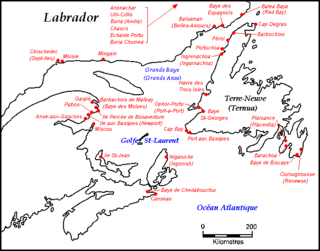Algonquian–Basque pidgin
You can help expand this article with text translated from the corresponding article in Basque. (July 2014) Click [show] for important translation instructions.
|
| Algonquian–Basque pidgin | |
|---|---|
| Region | Gulf of Saint Lawrence |
| Era | 16th to 18th century[1] |
Basque-based pidgin | |
| Language codes | |
| ISO 639-3 | None (mis) |
| Glottolog | basq1252 |
 Basque and Breton fishing sites in 16th and 17th centuries. | |
Algonquian–Basque pidgin, also known as Souriquois,Gulf of Saint Lawrence. It was in use from at least 1580 until 1635,[2] and was last attested in 1711.[1][page needed]
There were three groups of First Nations that the Basque people distinguished. The ones with which they had good relations were the Montagnais and the St. Lawrence Iroquoians. They also knew of the Inuit, whom they considered hostile. The Basque people referred to them as the Montaneses, the Canaleses, and the Esquimoas, respectively.[3]
Vocabulary
| Pidgin | Original language | English translation |
|---|---|---|
| Normandia | Normandia (Basque), 'Normandy' | French |
| kir | kir (Mi'kmaq) | you |
| ania | anaia (Basque) | brother |
| capitana | capitaina (Basque), kapitaina in Standard Basque | captain |
| endia | andia (Basque), handia in Standard Basque | large |
| chave | chave ( Romance )
|
know |
| ouias | wiya:s (Innu-aimun) | meat |
| amiscou | amisku (Innu-aimun) | beaver |
Sample phrases
| Algonquian–Basque pidgin | Basque | English |
|---|---|---|
| Ania, kir capitana? | Anaia, capitana al zara? | Brother, are you a captain? |
| Ania capitana ouias amiscou. | Anaia capitana kastor haragia. | Brother captain beaver's meat. |
| Endia chave Normandia. | Frantsesek gauza asko dakite. | The French know a lot of things. |
| Gara gara ender-quir gara gara. | Guda izango dugu. | There will be war if we continue like this. |
| Maloes mercatora. | Malo Deunakoak merkatari bidegabekoak dira. | Those of Saint-Malo are unfair traders. |
| Nola zaude? Apezak obeto. | Nola zaude? Apaizak hobeto. | How are you? The priests are better. |
See also
References
- ^ JSTOR 30027995.
- ^ ISBN 9781107392809.
- ^ "Echoes from the Past". Archived from the original on 2012-09-29. Retrieved 2012-07-06.
- ISBN 9781571812100.
The Language Encounter in the Americas, 1492-1800: A Collection of Essays.
Further reading
- Donostia, Gipuzkoako Foru Aldundia.
